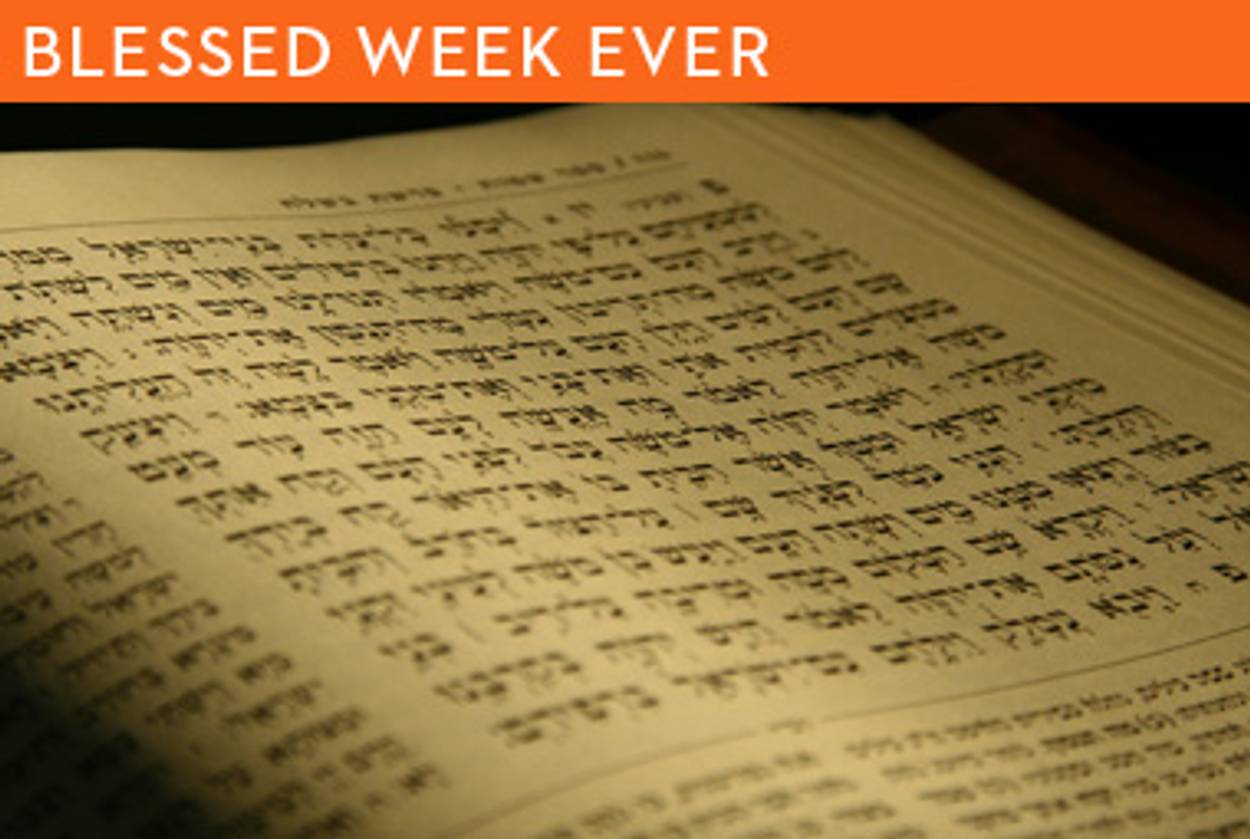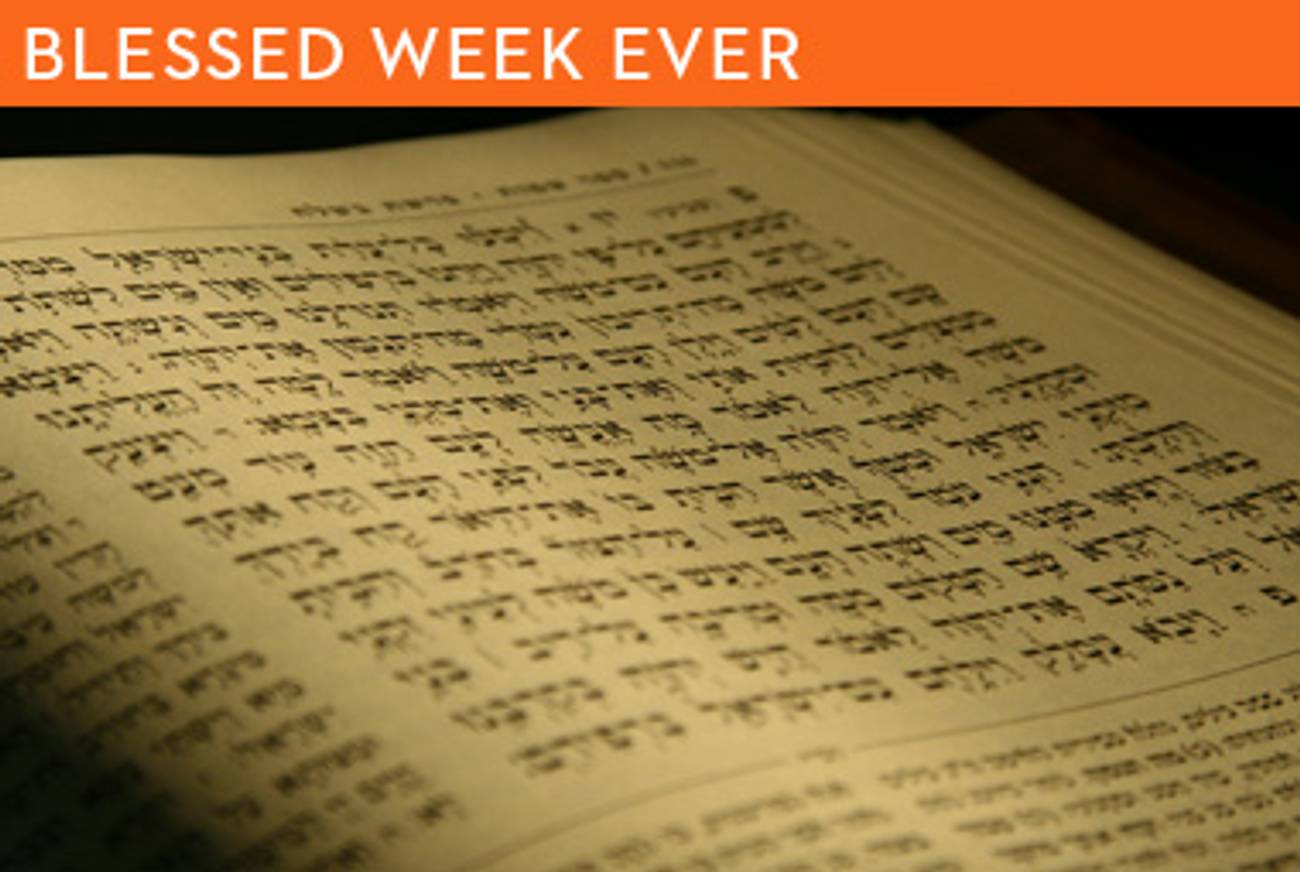By the Book
Or, How I Learned to Stop Worrying and Love the Torah




Having inadvertently messed up the schedule by writing about this week’s haftorah last week, I decided to take this opportunity and reflect on what I’ve learned in two years of reading and writing about the Bible.
Until two years ago, I was no more familiar with the Torah than I was with Beverly Hills, 90210.
I admit that I knew both texts intimately: Growing up in Israel, I spent each Friday afternoon with one and each Saturday morning with the other. I followed closely the stories each told. I memorized the kind of negligible details only a youthful admirer might notice, like Noah’s age when he died (950) or the license plate on Steve Sanders’ Corvette (I8A4RE. Say it quickly). But I was not a thoughtful consumer of either sacred text. I read and watched, but I didn’t care much.
When I was asked to begin writing a weekly column for Tablet’s predecessor, Nextbook, commenting on the week’s parsha, or Torah portion, I approached the task with wry amusement. My mandate was to unearth any relevance the Torah may have to contemporary life, and to ascertain what, if anything, we young, secular, and not exceedingly educated Jews might learn from the Good Book. I looked forward to writing biting critiques that gently mocked the ancient book’s strange and antiquated stories. I expected to feel everything but enlightenment.
Two years into my journey—after a year of writing about the parsha, I moved on to commenting on the haftorah, the weekly reading from the Book of Prophets that supplements the Torah portion—I have changed in profound ways. I have no plans to observe the Sabbath, and I still consider my burger bereft unless veiled by a thick layer of Gruyère, but reading the Bible closely each week, and asked to grapple with its meanings, I feel more resilient than I’d ever been in my faith.
Some readers, I know, may be unwilling to free faith from the tethers of ritual and will consider my own brand of belief invalid or flawed. Without delving into details—the intricacies of the matter are too great to paint on such a modest canvass—I will say that at the core of my faith is a fervent belief in God, coupled with a strong skepticism that any one human, or any one book, could ever grasp the entirety, the enormity of his mysterious and ultimately unknowable will.
And while I don’t believe the Bible to be literally divine, I have come to see in it an astonishingly astute guide to human thought and behavior, a beacon in whose light us moderns—having ravaged with conviction every last bit of certainty, weary with knowledge and wary of truth—might do well to walk.
Of all the lessons the Torah had taught me, one stands above all: There is a God, but the rest is up to us.
Consider Sinai. If we look at the Bible as a tale, the moment at the foothill of the mount is its absolute peak. Everything we’ve read so far has been leading up to this. God chooses Noah, then Abraham, then makes Abraham into a nation, then banishes that nation into exile in Egypt. Finally, they are redeemed. Finally, God is willing to speak to the whole people. He’ll give them his living word, his law. He’ll tell them what it’s all about. But here’s what God has to say: “Ye shall be unto me a kingdom of priests, and an holy nation.” That’s it.
Listening intently, the Israelites may be forgiven for feeling somewhat swindled. God, after all, had just told them that they were his Chosen People, but he hadn’t told them why, and, more bafflingly, he hadn’t told them what, now that he had conferred on them this most singular status, he expected them to do with it. A kingdom of priests? A holy nation? That’s hardly a blueprint for peoplehood.
At the heart of Divine Election—a chosenness that extends in time and applies not just to the particular people huddling in the desert millennia ago but to all Jews in perpetuity—is doubt. We understand, of course, that observing God’s laws is an irrevocable component of redemption, but it is not the only one. Sinai suggests something else, something spiritual. It invites us to wonder what it means, to question how we should act to prove worthy of being the Lord’s favorite sons and daughters. It puts the onus on us.
This, I believe, is one of the Bible’s most awesome tenets. Judaism shies away from heavenly arithmetic; it is not a world where the good and the bad are both calculated, measured against some divine standard, and used to determine life and fate. It’s not a religion that poses a straight and narrow path to salvation and punishes anyone who transgresses. Instead, in weekly portion after weekly portion, we get deliberate ambiguity and exhortations to take action.
Take Isaiah, for example. “This people I formed for Myself,” says the prophet, channeling the voice of God. “They shall recite My praise. But you did not call Me, O Jacob, for you wearied of Me, O Israel. You did not bring Me the lambs of your burnt offerings, nor did you honor Me with your sacrifices; neither did I overwork you with meal-offerings nor did I weary you with frankincense. Neither did you purchase cane for Me with money, nor have you sated Me with the fat of your sacrifices. But you have burdened Me with your sins; you have wearied Me with your iniquities. I, yea I, erase your transgressions for My sake, and your sins I will not remember.”
Writing about this passage a few weeks ago, I commented on its astounding lack of causality: The people sin grievously, yet God gracefully forgives. In Judaism, unlike its sister monotheistic religions, salvation doesn’t necessarily depend on prior action. Salvation comes first; what you choose to do with it is the whole point.
That is the message of Isaiah, the message of Sinai, the message of Moses and numerous others of our spiritual founding fathers. It’s a message of responsibility and of purposefulness. It’s also a message of freedom: Rather than a painting-by-numbers approach to morality and mortality—follow the rules and go straight to heaven—Judaism revolves around that chief faculty that distinguishes us from God’s other creations, namely free will. The rules are all set, but we’re free to rebel.
Which, needless to remind, we do. Forty days after receiving the Word of God, the Israelites make themselves a golden calf. For 40 years in the desert, they gripe and moan. They’re such incurable complainers that God himself calls them a stiff-necked people. And yet he seldom punishes them and never abandons them. He knows they’re human and that the only way they can be redeemed is not by accepting him unconditionally, or subjecting themselves to his every word, but by slowly overcoming their own weaknesses and learning to be a little bit more divine each day.
At its center, then, Judaism places Man. Blessed in his confusion, holy in his errors, searching. The search is the thing; the goal is less important. Not for us all this eschatology: Time and again, the rabbis remind us that there is no difference between this world and the days of the Messiah except for removing the yoke of foreign bondage. Our Messiah is not only ordinary, he’s a paradox: As Michael Walzer astutely noted, the Jewish Messiah can only come when the entire people are worthy of him, by which point the Messiah is no longer needed. If it’s salvation we want, Judaism teaches us, we’re going to have to do it ourselves.
These are some of the lessons I’ve learned from reading the Bible. I’d like to think that they’ve made me more observant, not in practice but in thought. Like those trembling Hebrews at Sinai, I’m overwhelmed by the peerless heights; I look up and can’t see the sky. And like them, too, I suspect that there’s a good 40-year-trek lying ahead, most likely with no Promised Land on the other side. Never mind; I’ve got one hell of a guidebook.
Liel Leibovitz is a senior writer for Tablet Magazine and a host of the Unorthodox podcast.
Liel Leibovitz is editor-at-large for Tablet Magazine and a host of its weekly culture podcast Unorthodox and daily Talmud podcast Take One. He is the editor of Zionism: The Tablet Guide.